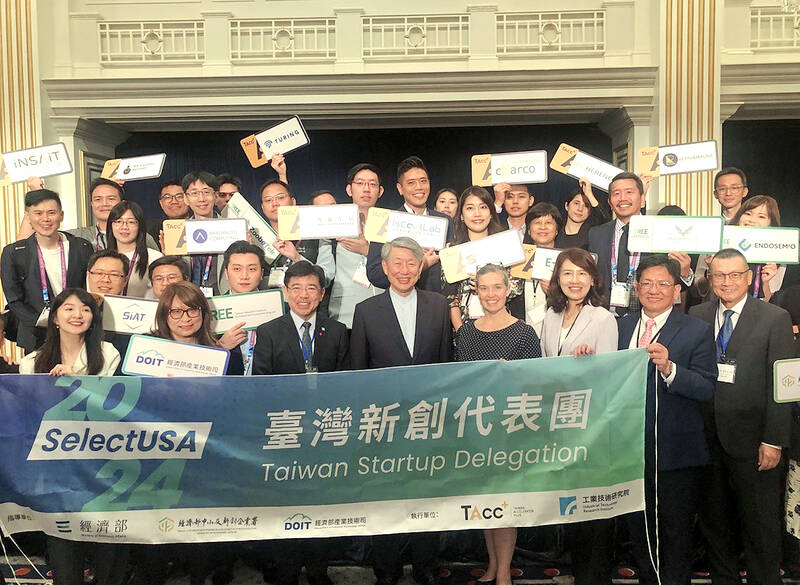President William Lai’s (賴清德) administration is considering a plan to import labor to deal with an impending shortage of engineers and other highly skilled workers, Minister of Economic Affairs J.W. Kuo (郭智輝) said in Washington on Tuesday.
Kuo was leading a delegation attending the SelectUSA Investment Summit.
Taiwan must attract about 400,000 to 500,000 skilled foreign workers for high-end manufacturing jobs by 2040, he said.

Photo: CNA
Ministry of Economic Affairs officials are still calculating the precise number of workers that are needed, as it works on loosening immigration restrictions and creating incentives, Kuo said.
Taiwanese firms operating factories in the US and other countries would help implement part of the plan by establishing education-to-employment pipelines stretching back to Taiwan, he said.
The firms would offer grants to attract high-achieving young people to study and work in Taiwan, he said.
After being professionally trained, they would return to their country of origin to work for the Taiwanese firm’s local branch, Kuo said.
Meanwhile, foreign-based companies building data centers in Taiwan would be required to employ a half-and-half workforce made up of foreign and local engineers to boost the nation’s indigenous research and development capabilities, he said.
These measures are necessary because population decline is expected to reduce the domestic supply of elite workers needed by the high-end manufacturing industries crucial to the nation’s economy, Kuo said.
Importing workers would not negatively affect Taiwan’s job market, as the foreign workers would be employed to deal with a labor shortage in Taiwan’s industries, he said.
The Ministry of the Interior is reviewing immigration and tax laws to see if changes can be made to facilitate recruitment for Taiwanese semiconductor, medical care and biopharmaceutical firms, Kuo said.
The nation’s technical leadership in these fields could help to recruit foreign talent, he added.
Kuo said he visited the US state, commerce and treasury departments to communicate the importance of eliminating double taxation with the US, he said.
The delegation emphasized that the issue is a stumbling block for Taiwanese small and medium-sized businesses planning to invest in the US, Kuo said.
US officials were urged to draft a bill to deal with that problem, he said, adding that the officials expressed optimism that the US Congress would swiftly pass related legislation awaiting review in the US Senate.

DEFENDING DEMOCRACY: Taiwan shares the same values as those that fought in WWII, and nations must unite to halt the expansion of a new authoritarian bloc, Lai said The government yesterday held a commemoration ceremony for Victory in Europe (V-E) Day, joining the rest of the world for the first time to mark the anniversary of the end of World War II in Europe. Taiwan honoring V-E Day signifies “our growing connections with the international community,” President William Lai (賴清德) said at a reception in Taipei on the 80th anniversary of V-E Day. One of the major lessons of World War II is that “authoritarianism and aggression lead only to slaughter, tragedy and greater inequality,” Lai said. Even more importantly, the war also taught people that “those who cherish peace cannot

STEADFAST FRIEND: The bills encourage increased Taiwan-US engagement and address China’s distortion of UN Resolution 2758 to isolate Taiwan internationally The Presidential Office yesterday thanked the US House of Representatives for unanimously passing two Taiwan-related bills highlighting its solid support for Taiwan’s democracy and global participation, and for deepening bilateral relations. One of the bills, the Taiwan Assurance Implementation Act, requires the US Department of State to periodically review its guidelines for engagement with Taiwan, and report to the US Congress on the guidelines and plans to lift self-imposed limitations on US-Taiwan engagement. The other bill is the Taiwan International Solidarity Act, which clarifies that UN Resolution 2758 does not address the issue of the representation of Taiwan or its people in

Taiwanese Olympic badminton men’s doubles gold medalist Wang Chi-lin (王齊麟) and his new partner, Chiu Hsiang-chieh (邱相榤), clinched the men’s doubles title at the Yonex Taipei Open yesterday, becoming the second Taiwanese team to win a title in the tournament. Ranked 19th in the world, the Taiwanese duo defeated Kang Min-hyuk and Ki Dong-ju of South Korea 21-18, 21-15 in a pulsating 43-minute final to clinch their first doubles title after teaming up last year. Wang, the men’s doubles gold medalist at the 2020 and 2024 Olympics, partnered with Chiu in August last year after the retirement of his teammate Lee Yang

The Philippines yesterday criticized a “high-risk” maneuver by a Chinese vessel near the disputed Scarborough Shoal (Huangyan Island, 黃岩島) in a rare incident involving warships from the two navies. The Scarborough Shoal — a triangular chain of reefs and rocks in the contested South China Sea — has been a flash point between the countries since China seized it from the Philippines in 2012. Taiwan also claims the shoal. Monday’s encounter took place approximately 11.8 nautical miles (22km) southeast” of the Scarborough Shoal, the Philippine military said, during ongoing US-Philippine military exercises that Beijing has criticized as destabilizing. “The Chinese frigate BN 554 was